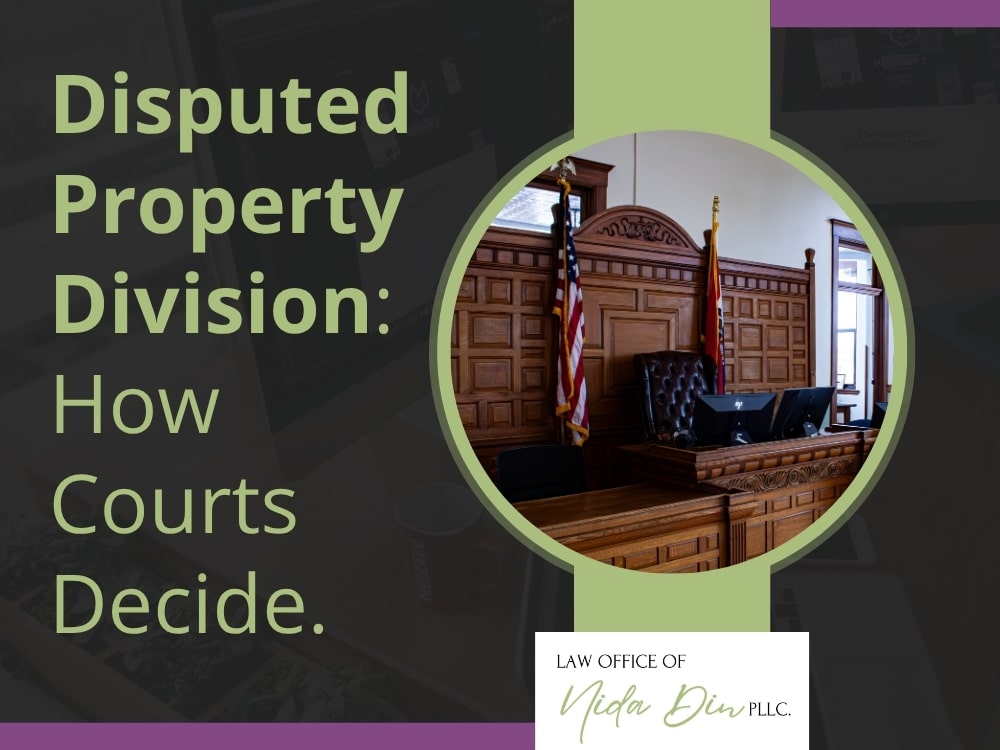Texas Property Division Lawyer
Property division during a divorce can be a challenging and emotional process. At The Law Office of Nida Din, PLLC, we understand the importance of protecting your financial future while ensuring a fair and equitable distribution of assets.
Our experienced Texas property division lawyer is here to guide you through every step of the legal process, providing compassionate and personalized representation tailored to your unique situation. Whether dealing with community property, separate assets, or contested disputes, we are committed to advocating for your best interests with skill and dedication.
Table of Contents
Don't Wait Until It's Too Late. Request a
Consultation Today!
What is the Property Division?
Property division is the process of dividing assets and debts between spouses during a divorce. In Texas, this division is guided by the principle of community property, which generally means that most property acquired during the marriage is considered jointly owned and is divided fairly between the spouses.

Types of Property in Divorce Property Division
Community Property
Community property includes most assets and debts acquired during the marriage, regardless of whose name is on the title. Examples include income, real estate, and personal property bought with marital funds.
Separate Property
This includes assets and debts that were owned before the marriage or received as gifts or inheritances during the marriage, as long as they are kept separate from community property.
Mixed or Commingled Property
Sometimes community and separate assets become mixed together. For example, if inheritance money is deposited into a joint bank account and used for family expenses, it may be treated as community property. This is why clear records are important to avoid confusion.
Appreciation of Assets
Even if an asset is separate at the beginning, community property rights can apply if both spouses contribute to its growth. For instance, if one spouse owned a house before marriage but community funds were used for renovations, the increase in value may be partly community.
Maintaining Separate Status
Separate property must be kept apart from community funds to avoid being reclassified. For example, if you inherit money, keeping it in an account under your name alone helps preserve its separate status. Mixing it with marital income can make it harder to prove later.
Burden of Proof
In Texas, the law presumes all property at the time of divorce is community. To prove that something is separate, the spouse claiming ownership must provide clear evidence, such as receipts, deeds, or inheritance records.
Don't Wait Until It's Too Late. Request a
Consultation Today!
What Happens if Property is Disputed?
If you and your spouse cannot agree on how to divide the property, the court will make the decision for you. This often involves a trial where each side presents evidence and arguments.

Steps in Property Division
The process involves several steps:
- Identifying Property: Listing all assets and debts.
- Classifying Property: Determining which items are community or separate property.
- Valuing Property: Appraising the value of the assets and debts.
- Dividing Property: Allocating the assets and debts between the spouses.
In Texas, property is divided in a manner that is “just and right,” which means fair but not necessarily equal. The court considers various factors, such as the length of the marriage, each spouse’s financial situation, contributions to the marriage, and any fault in the divorce.
How is Property Divided?
Division of Debts
Debts incurred during the marriage are usually considered community debt and are divided similarly to assets. Debts incurred before the marriage or by one spouse alone may be considered separate.
Impact of Property Division on Future Finances
The division of property can impact your future financial situation. Consider how the division of assets and debts will affect your long-term financial stability, such as your ability to buy a home or save for retirement.
Don't Wait Until It's Too Late. Request a
Consultation Today!
Frequently Asked Questions to a Texas Property Division Lawyer
When Should I Hire a Property Division Lawyer in Texas?
It is best to hire a property division lawyer as soon as divorce becomes likely or once you know that property and assets will need to be divided. Early involvement allows your lawyer to gather documentation, identify separate property, and prepare arguments before disputes arise. This can prevent mistakes that could affect the outcome of your case.
How Does Texas Property Division Differ from Other States?
Texas is one of nine community property states in the U.S. This means that most assets and debts acquired during the marriage are considered jointly owned, regardless of whose name is on the title.
Many other states follow “equitable distribution,” where property is divided fairly but not based on strict community property rules. This makes Texas property division unique compared to most states.
What Factors Do Texas Courts Consider in a Just and Right Division?
Courts in Texas look beyond a simple 50/50 split when dividing community property. Judges may consider the length of the marriage, the earning capacity of each spouse, the health of both parties, child custody arrangements, and whether one spouse was at fault for the breakdown of the marriage. The goal is a division that is fair, even if not equal.
Can Texas Property Division Be Modified After Divorce?
Once property has been divided and the divorce is finalized, the division is generally permanent and cannot be modified. However, if one spouse concealed assets during the divorce, the court may reopen the case and adjust the division. In contrast, child support or custody orders can be modified, but property division is rarely revisited.
Schedule a Consultation With Our Property Division Lawyer
A property division lawyer ensures your separate property is protected during divorce. Texas law distinguishes community and separate property, but proving ownership often requires documentation like deeds, receipts, or inheritance records.
If you need support protecting assets or ensuring fair division, Nida Din is the lawyer you can trust. Contact the Law Office of Nida Din today to secure your future.

